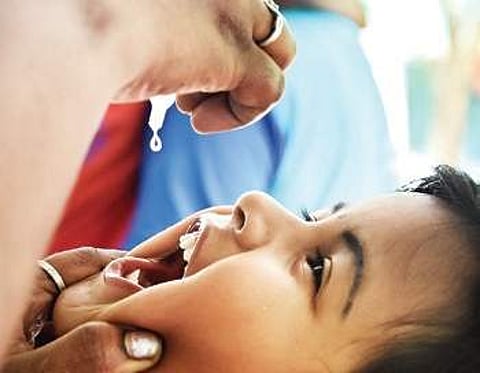

NEW DELHI: With a bottle of sanitiser in his pocket and a mask on his face, 60-year-old Rameshwar Prasad walks long distances, sometimes wading through rivers, to ensure children in Bihar's Gaya district, who were not vaccinated for preventable infections due to the COVID-19 lockdown, are covered under routine immunisation services.
Prasad is a vaccine courier who goes house to house, identifying children and pregnant women who missed their routine vaccines against infections and diseases like tetanus and diphtheria, and also ensures vaccines are delivered on time.
"If I don't go, it will affect so many women and children. So, I have continued to do it with all precautions like wearing a face mask, washing my hands regularly and maintaining physical distance during collection and distribution of vaccines," said Prasad, who is part of a pan-India network of around two lakh vaccine couriers.
Prasad said he cycled, walked and even waded through rivers to deliver vaccines to remote parts of Gaya district.
"When I have to go to Bentanawadhi village, I have to park my cycle in a neighbouring village. Then I have to walk two kilometres to reach there as there is no proper road. During this rainy season, I wade through rivers to ensure that vaccines reach on time," he said,
In Karnataka's Lingsugur Taluk, 26-year-old Najeeta Begum, an auxiliary nurse midwife (ANM), braves tough terrain to reach villages.
"The villagers ask me, 'we have been asked not to venture out, why are you travelling?'. I had to answer and convince them that I am here to vaccinate a child or meet a pregnant women," Begum said.
The village-level health worker said she, as per schedule, managed to cover everyone who missed their vaccination.
Begum and Prasad, like the rest of the couriers, work under the alternate vaccine delivery system (AVDS), which ensures immunisation of pregnant women and children while following COVID-19 appropriate behaviour.
The system is run by the government, UNICEF along with members of local village bodies, self-help groups, youths, volunteers, among others.
The couriers also inform people about routine vaccines and ask families not to miss their vaccination schedule at sub-health centres.
The UNICEF has supported the training of 674 cold chain handlers, 36 cold chain technicians and almost 45,000 alternate vaccine delivery personnel before the re-introduction of outreach immunisation sessions from May.
The lockdown across the country was imposed in March-end to prevent the spread of the coronavirus.
This training was necessary as vaccines need to be stored and transported at a certain temperature to ensure their potency and efficacy.
The UN body said that it has also given a 'Bridge' training session to improve personnel's communication skills to deal with families and motivate them to come forward for vaccination.
There were some gaps in coverage (immunisation services) because of the COVID-19 pandemic due to restriction in movement of man and material to contain the spread of the infection, a senior government official said.
"However, the government came up with guidelines to ensure access to essential services in mid-April that resulted in guiding states on how to conduct vaccination sessions by taking due precautions.
The states too worked on innovative ideas and the services were restored," the official said.
Elaborating on the process of the alternate system, a UNICEF spokesperson said during and after the lockdown when the regular road transport mechanism was affected, this system was functional and it supported in vaccine delivery and resumption of routine immunisation services.
"The AVDS is based on local need, and depending upon local support and means for transport," he said.
Local support is provided by a wide variety of committed community members ranging from youths, volunteers, self help groups to farmers, drivers etc.
India air force helicopters too came forward to support vaccine delivery in unreachable areas in north-eastern regions, the spokesperson said.
The government along with partners ensured supportive supervision visits for outreach sessions and hand holding health workers for surveys to identify children who missed routine immunisation.
The spokesperson said that there was a decline in vaccination in the initial months of lockdown (April and May), however recovery trends were seen in the subsequent months.
Reluctance to visit vaccination centres for the fear of exposure to COVID-19 infection was not the only reason for a slump in vaccination but issues like limited public transport, lockdown measures and physical distancing, too, prevented people from taking their children for vaccination or even visiting health centres, he said.
"But, India was quick to respond to this unprecedented situation and the results have been telling.
Basic immunisation services have received a huge boost and the vaccination drive has reached pre-pandemic levels," the spokesperson said.
Luigi d'Aquino, Chief of Health, UNICEF India, called it vital to ensure that immunization services continue to be available to every child, and that communities, families, and caregivers of children are continually aware of the importance of full immunization.
Henrietta Fore, UNICEF Executive Director, said that "we cannot allow the fight against one deadly disease to cause us to lose ground in the fight against other diseases" She said addressing the global COVID-19 pandemic is critical.
"However, other deadly diseases also threaten the lives of millions of children in some of the poorest areas of the world.
That is why today we are urgently calling for global action from country leaders, donors and partners," she said.
From January till August 2020, over 12 million children were vaccinated, according to data from the Union Health Ministry.